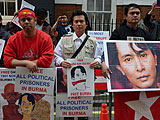Burma’s Looming Election Sham
By Simon Roughneen for ISN
When people in the West think of Burma, thoughts most likely turn to the iconic opposition figure Aung San Suu Kyi, who has been locked up for most of the past 20 years, more or less spanning the time since Nelson Mandela's release from jail in South Africa. Her crime: winning the country's single election since the military took power in 1962, 14 years after Burma became independent from Britain.
Burma is due to hold elections again this year, but Suu Kyi is not permitted to run. The military regime in charge of the country since 1962 seems determined to hold onto power and looks likely to use the elections to try to craft some form of civilian veneer for continued army rule.
The constitution reserves 25 percent of the seats in the proposed new parliament for the army, which is enough to block any attempt to change the law in Burma.
As for the rest, the army is setting up front parties, with officers and civil servants resigning their posts, under orders from the top, to ‘compete’ in the elections.
But nobody knows when the elections will take place, other than sometime in 2010. There are rumors that the astrology-prone generals will hold it on the numerically auspicious day of 10 October (10/10/10), but nothing is clear. There is no election law or framework in place yet.
As such, the opposition parties have not decided whether or not to run. The regime would probably like it if they did, as it would give some form of legitimacy to sham elections with a pre-ordained outcome.
One of the reasons why Suu Kyi's National League for Democracy will commit to taking part in the election now is the continued detention of over 2,000 political prisoners in Burma. Despite calls from the US for these to be freed as a necessary pre-condition for free and fair elections, the number of prisoners has gone up since this time last year.
Like many Burmese who have a history of opposing the military regime, Bo Kyi now must live in exile. Based in Thailand, he heads up the Assistance Association for Political Prisoners in Burma. He told ISN Security Watch that most of the prisoners were rounded up after the 2007 fuel price protests, which then mushroomed into the monk-led pro-democracy demonstrations now known as the Saffron Revolution.
Many were given 50-year-plus sentences with hard labor and are held in remote, dilapidated prisons far from family, often in solitary confinement and without medical treatment.
Last week, UN envoy Tomas Ojea Quintana made a 5-day visit to assess the human rights situation in the country. He was not permitted to meet Suu Kyi and concluded his visit by saying it would be difficult to see how free and fair elections could be held in Burma this year.
The envoy did get to meet Suu Kyi's number 2, 82-year-old Tin Oo, who was released from house arrest by the regime over the weekend (the weekend just before the envoy arrived). Tin Oo is a former leading army figure who grew disaffected with military rule and helped found the NLD. He was originally detained in 2003 for the apparent crime of surviving an assassination attempt on Suu Kyi and other opposition figures in which dozens of their supporters were killed.
Tin Oo's son, Thant Zin, believes his father’s release is part of a regime show to lend credence to illusions of democratic elections this year.
However, despite releasing the NLD vice chairman, the regime has locked up a number of other political prisoners in recent weeks. In January, a young female reporter received a 25-year jail term for giving recordings to foreign media highlighting the problems and dangers faced by journalists who want to cover Burma. The same day the UN envoy arrived, four women were sentenced to two years in prison and hard labor after being accused of offering alms to Buddhist monks - alms that included religious literature.
The Obama administration has begun talks with the military regime, offering to reduce sanctions if the generals respond by releasing prisoners and holding free elections.
The response? When Nyi Nyi Aung, a Burmese-born US citizen came to Burma late in 2009 to visit his sick mother, he was tortured and then jailed on hazy passport and foreign currency charges. His mother languishes in prison for taking part in the 2007 Saffron Revolution. His Burmese fiancé, now working as a nurse in Maryland, last week penned an impassioned plea for the Obama administration to do more to free Mr Aung, carried in the Wall St Journal. She concluded bluntly: "President [Barack] Obama and Secretary [of State Hillary] Clinton, my message is simple. Neither your words nor your actions show that you take my fiancé's imprisonment seriously."

